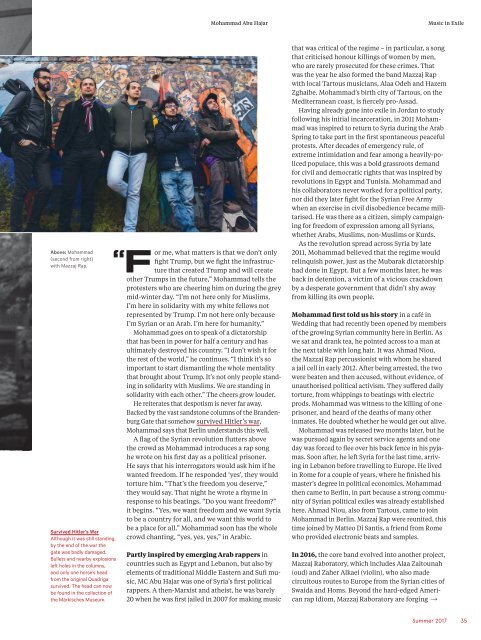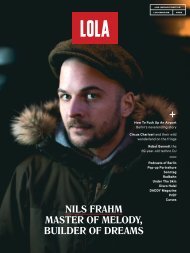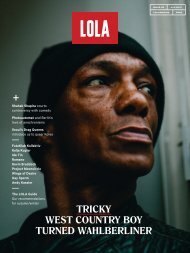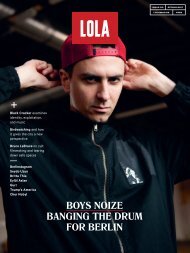LOLA Issue Four
Issue Three of LOLA Magazine. Featuring the people and stories that make Berlin special: Moderat, Microdosing LSD, Yony Leyser, Julia Bosski, Notes of Berlin, Sara Neidorf and more.
Issue Three of LOLA Magazine. Featuring the people and stories that make Berlin special: Moderat, Microdosing LSD, Yony Leyser, Julia Bosski, Notes of Berlin, Sara Neidorf and more.
Create successful ePaper yourself
Turn your PDF publications into a flip-book with our unique Google optimized e-Paper software.
Mohammad Abu Hajar<br />
Music in Exile<br />
Above: Mohammad<br />
(second from right)<br />
with Mazzaj Rap.<br />
Survived Hitler’s War<br />
Although it was still standing,<br />
by the end of the war the<br />
gate was badly damaged.<br />
Bullets and nearby explosions<br />
left holes in the columns,<br />
and only one horse’s head<br />
from the original Quadriga<br />
survived. The head can now<br />
be found in the collection of<br />
the Märkisches Museum.<br />
“<br />
For me, what matters is that we don’t only<br />
fight Trump, but we fight the infrastructure<br />
that created Trump and will create<br />
other Trumps in the future,” Mohammad tells the<br />
protesters who are cheering him on during the grey<br />
mid-winter day. “I’m not here only for Muslims,<br />
I’m here in solidarity with my white fellows not<br />
represented by Trump. I’m not here only because<br />
I’m Syrian or an Arab. I’m here for humanity.”<br />
Mohammad goes on to speak of a dictatorship<br />
that has been in power for half a century and has<br />
ultimately destroyed his country. “I don’t wish it for<br />
the rest of the world,” he continues. “I think it’s so<br />
important to start dismantling the whole mentality<br />
that brought about Trump. It’s not only people standing<br />
in solidarity with Muslims. We are standing in<br />
solidarity with each other.” The cheers grow louder.<br />
He reiterates that despotism is never far away.<br />
Backed by the vast sandstone columns of the Brandenburg<br />
Gate that somehow survived Hitler’s war,<br />
Mohammad says that Berlin understands this well.<br />
A flag of the Syrian revolution flutters above<br />
the crowd as Mohammad introduces a rap song<br />
he wrote on his first day as a political prisoner.<br />
He says that his interrogators would ask him if he<br />
wanted freedom. If he responded ‘yes’, they would<br />
torture him. “That’s the freedom you deserve,”<br />
they would say. That night he wrote a rhyme in<br />
response to his beatings. “Do you want freedom?”<br />
it begins. “Yes, we want freedom and we want Syria<br />
to be a country for all, and we want this world to<br />
be a place for all.” Mohammad soon has the whole<br />
crowd chanting, “yes, yes, yes,” in Arabic.<br />
Partly inspired by emerging Arab rappers in<br />
countries such as Egypt and Lebanon, but also by<br />
elements of traditional Middle Eastern and Sufi music,<br />
MC Abu Hajar was one of Syria’s first political<br />
rappers. A then-Marxist and atheist, he was barely<br />
20 when he was first jailed in 2007 for making music<br />
that was critical of the regime – in particular, a song<br />
that criticised honour killings of women by men,<br />
who are rarely prosecuted for these crimes. That<br />
was the year he also formed the band Mazzaj Rap<br />
with local Tartous musicians, Alaa Odeh and Hazem<br />
Zghaibe. Mohammad’s birth city of Tartous, on the<br />
Mediterranean coast, is fiercely pro-Assad.<br />
Having already gone into exile in Jordan to study<br />
following his initial incarceration, in 2011 Mohammad<br />
was inspired to return to Syria during the Arab<br />
Spring to take part in the first spontaneous peaceful<br />
protests. After decades of emergency rule, of<br />
extreme intimidation and fear among a heavily-policed<br />
populace, this was a bold grassroots demand<br />
for civil and democratic rights that was inspired by<br />
revolutions in Egypt and Tunisia. Mohammad and<br />
his collaborators never worked for a political party,<br />
nor did they later fight for the Syrian Free Army<br />
when an exercise in civil disobedience became militarised.<br />
He was there as a citizen, simply campaigning<br />
for freedom of expression among all Syrians,<br />
whether Arabs, Muslims, non-Muslims or Kurds.<br />
As the revolution spread across Syria by late<br />
2011, Mohammad believed that the regime would<br />
relinquish power, just as the Mubarak dictatorship<br />
had done in Egypt. But a few months later, he was<br />
back in detention, a victim of a vicious crackdown<br />
by a desperate government that didn’t shy away<br />
from killing its own people.<br />
Mohammad first told us his story in a café in<br />
Wedding that had recently been opened by members<br />
of the growing Syrian community here in Berlin. As<br />
we sat and drank tea, he pointed across to a man at<br />
the next table with long hair. It was Ahmad Niou,<br />
the Mazzaj Rap percussionist with whom he shared<br />
a jail cell in early 2012. After being arrested, the two<br />
were beaten and then accused, without evidence, of<br />
unauthorised political activism. They suffered daily<br />
torture, from whippings to beatings with electric<br />
prods. Mohammad was witness to the killing of one<br />
prisoner, and heard of the deaths of many other<br />
inmates. He doubted whether he would get out alive.<br />
Mohammad was released two months later, but he<br />
was pursued again by secret service agents and one<br />
day was forced to flee over his back fence in his pyjamas.<br />
Soon after, he left Syria for the last time, arriving<br />
in Lebanon before travelling to Europe. He lived<br />
in Rome for a couple of years, where he finished his<br />
master’s degree in political economics. Mohammad<br />
then came to Berlin, in part because a strong community<br />
of Syrian political exiles was already established<br />
here. Ahmad Niou, also from Tartous, came to join<br />
Mohammad in Berlin. Mazzaj Rap were reunited, this<br />
time joined by Matteo Di Santis, a friend from Rome<br />
who provided electronic beats and samples.<br />
In 2016, the core band evolved into another project,<br />
Mazzaj Raboratory, which includes Alaa Zaitounah<br />
(oud) and Zaher Alkaei (violin), who also made<br />
circuitous routes to Europe from the Syrian cities of<br />
Swaida and Homs. Beyond the hard-edged American<br />
rap idiom, Mazzaj Raboratory are forging<br />
Summer 2017<br />
35









